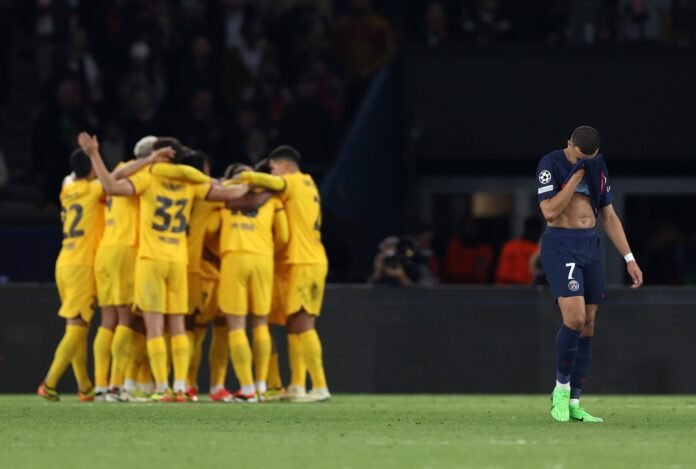It turns out the thrills and spills of this week’s Champions League quarter-final first legs were not reserved for the Bernabeu or Emirates stadium.
Paris Saint-Germain and Barcelona played out another mesmerising tie at Parc des Princes with the visitors, inspired by Raphinha’s first goals in the competition, recovering their poise magnificently after a brutal opening to the second half to claim a lead to take back to Catalonia.
Raphinha’s opener, converted after the shaky Gianluigi Donnarumma could only paw away a fine cross from Lamine Yamal, had given the visitors a first-half lead they merited. But Luis Enrique juggled his lineup at the interval and Ousmane Dembele, playing against his former club, hammered in an equaliser early in the second half.
Barca were still catching their breath when, within three minutes, Vitinha thrust the French side ahead, only for Raphinha and the substitute Andreas Christensen — with virtually his first involvement — to wrest back control of the tie.
So, with the Catalans in the ascendancy ahead of next week’s second leg at Montjuic, allow The Athletic to dissect the key talking points…
Did Luis Enrique get his starting lineup wrong?
Based on the opening five minutes of the second half alone, Luis Enrique’s half-time tactical tweaks had the desired effect.
Replacing false nine Marco Asensio with Bradley Barcola allowed PSG to move back to the 4-3-1-2 system that worked so well in the round of 16 second leg away at Real Sociedad — Kylian Mbappe and Bradley Barcola as split strikers with Ousmane Dembele operating as a No 10 and able to drop deep.
Vitinha puts PSG ahead (Chris Brunskill / Fantasista / Getty Images)
Just as important, though, was the shift of captain Marquinhos from right-back to centre-back, changing places with Lucas Hernandez.
8-10 – In the 1st half, Paris took the first seven shots of the match, before Barcelona took 10 of the next 11. Changeover. #PSGBAR pic.twitter.com/frxLzzC0gF
— OptaJean (@OptaJean) April 10, 2024
This offered greater protection against Robert Lewandowski as Barcelona had played long to their No 9 in the first half with repeated success. PSG’s split-striker system worked to pin Barcelona’s full-backs wider, better isolating their centre-backs to create angles to slip central midfielders into the box — which is exactly how Vitinha put PSG ahead.
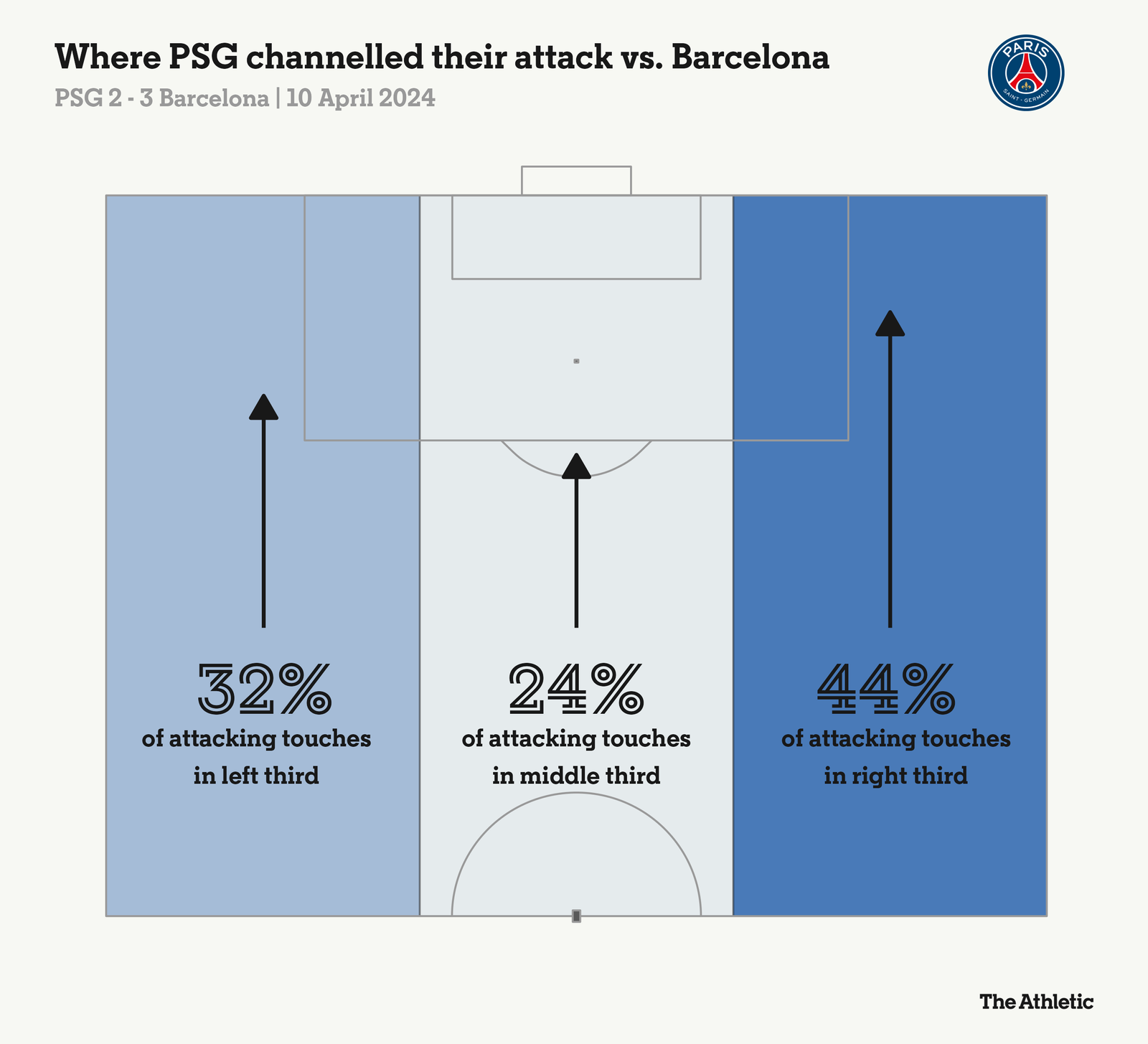
Liam Tharme
How did Xavi react to Luis Enrique’s changes?
It was all going so well for Barca — they had looked on top of Kylian Mbappe and his team-mates for much of the first half and were good value for their 1-0 lead.
But then Luis Enrique made some clever tweaks at the start of the second half and Dembele and Vitinha turned the game on its head within three minutes. Xavi was forced to react against his former coach — and his changes paid off.
Pedri’s introduction just after the hour provided an instant boost.
Less than a minute after he had come on for Sergi Roberto, he had played an inch-perfect pass over the top of the PSG defence for Raphinha to score his second and drag Barca back into the game. This was the midfielder’s first appearance since an injury at the start of March, but Xavi’s side need his quality in the build-up.
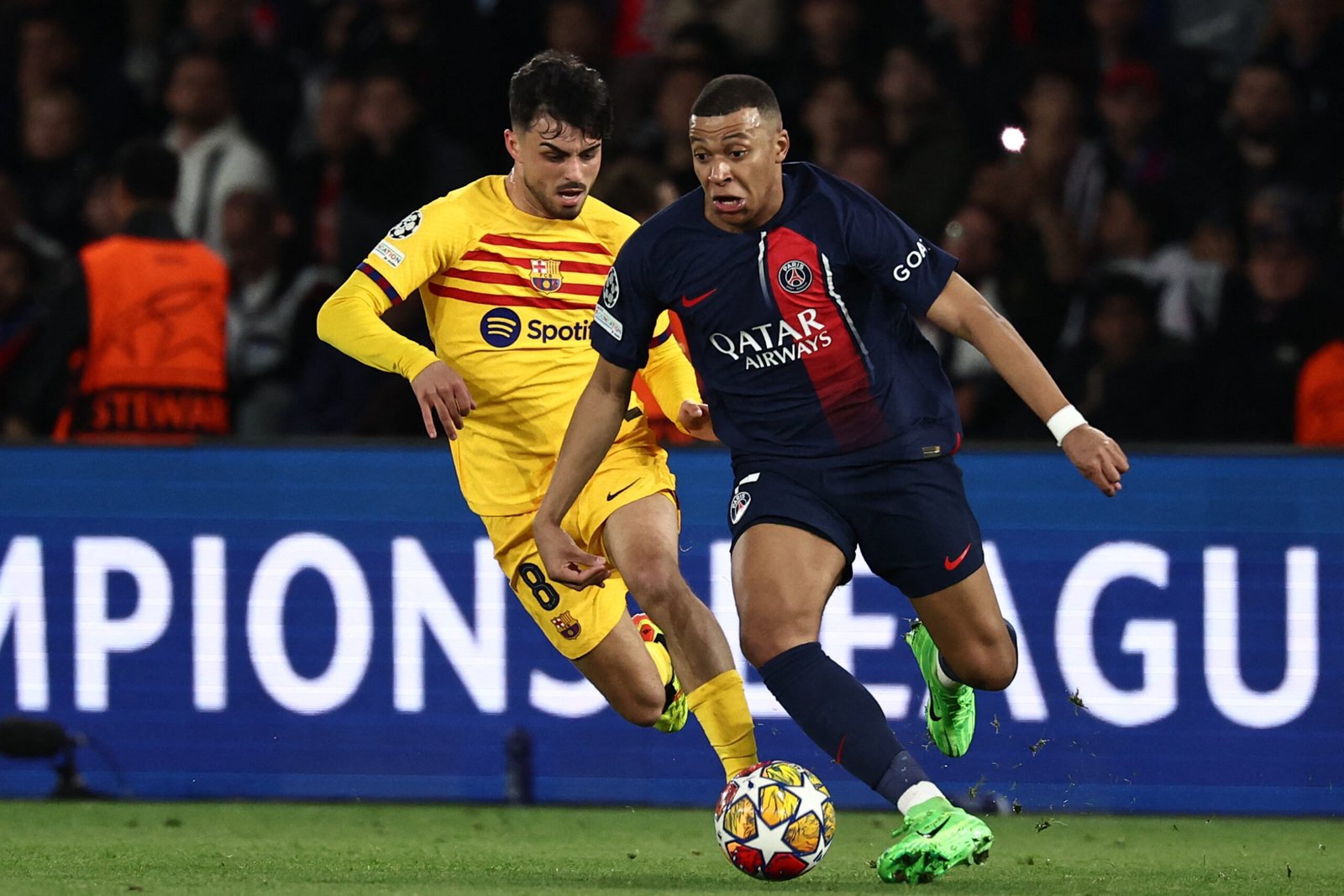
Pedri tracks Mbappe (ANNE-CHRISTINE POUJOULAT/AFP via Getty Images)
Barca’s third also came from a Xavi substitute making an instant impact. Andreas Christensen came on for Frenkie de Jong in the 75th minute; little more than a minute later, he was heading home past Donnarruma from Ilkay Gundogan’s corner to put Barca ahead again.
For all that Luis Enrique claimed his style represented Barcelona better than Xavi’s, the latter was able to rise to the challenge on this occasion.
Tomas Hill
Did we glimpse a bright future at Barca’s opener?
It is easy to forget just how young Lamine Yamal and Pau Cubarsi actually are. At 16 and 17 years old respectively, they rarely look out of place alongside their more experienced team-mates — even on a stage as grand as this.
At 16 years and 272 days old, Yamal became the youngest player to appear in a Champions League quarter-final and he played a key role in Raphinha’s 37th-minute opener. Robert Lewandowski offloaded to the winger and he put in what is fast becoming a trademark outside-of-the-boot cross for the Polish striker.
Donnarumma could only stretch a hand to it and Raphinha, calmly and precisely, was on hand to turn home his first Champions League goal.
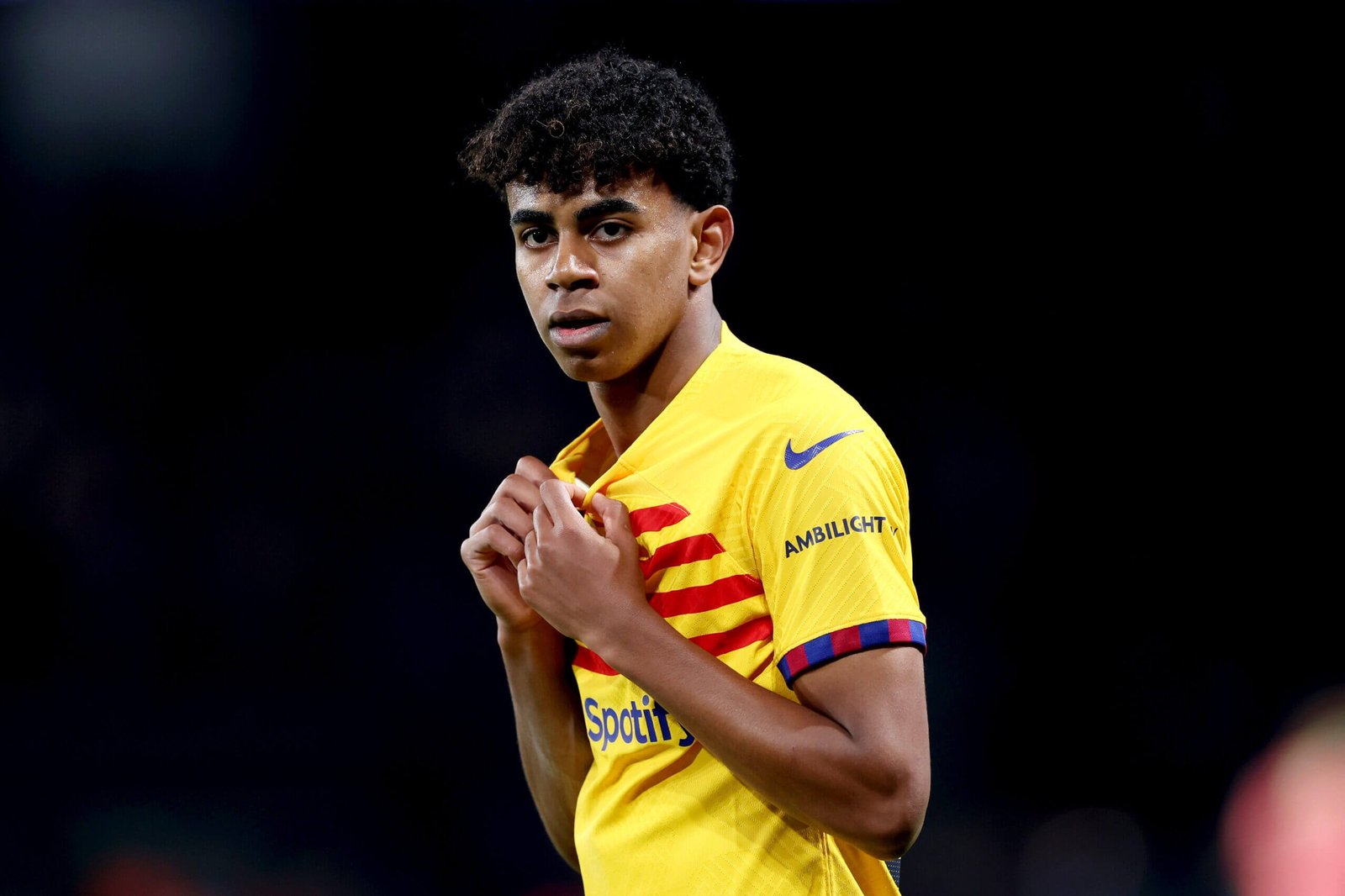
Yamal plays beyond his years at 16 (Alex Pantling/Getty Images)
But it all stemmed from Cubarsi.
A line-breaking pass from the centre-back to Lewandowski kickstarted the move and showed why he has already been compared to Barca greats such as Gerard Pique and Carles Puyol. He was equally nerveless in defence, looking assured when called upon and helping Barca neutralise Kylian Mbappe in the first half.

Cubarsi moves in to challenge Mbappe (FRANCK FIFE/AFP via Getty Images)
One moment summed it all up: Cubarsi sliding in to block a shot from Mbappe two minutes from the interval despite the Frenchman being well offside.
Cubarsi could not prevent Barca’s defensive collapse at the start of the second half — he was caught out by Vitinha’s run for his 50th-minute effort — but that was a brief reminder that this is a talent still in his formative years. With teenagers of this quality in the ranks, the future looks bright for Barca.
Tomas Hill
Was Dembele always going to haunt Barca?
Among the multitudes of sub-plots ahead of this fixture, the reunion of Dembele and Barcelona stood out.
His departure for PSG last summer shocked Barcelona; an unexpected transfer of a key player sold for a fee, at €50million (£42.8m; $53.7m), well below his true value.
Dembele has become an integral figure at his new club this season, even if he has not had the numbers to show it. Before tonight he had only scored one goal for PSG this season — his role is far more rounded than that — but it’s the criticism that masks the rest.
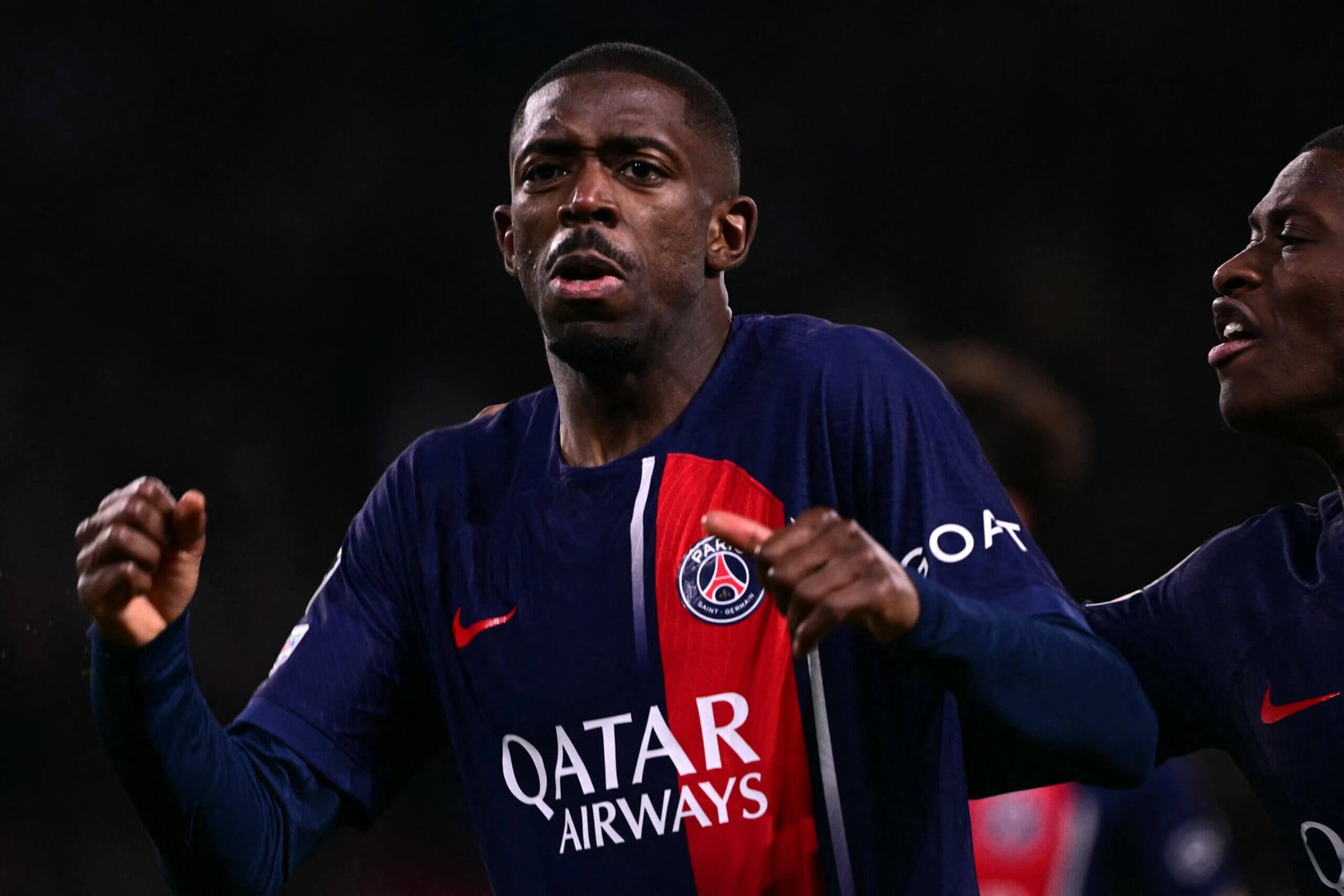
Dembele has been quietly impressive for PSG (MIGUEL MEDINA/AFP via Getty Images)
For 45 minutes, this match was passing him by but then, after Luis Enrique’s half-time changes, he came alive.
Just as against Real Sociedad in the round of 16, Dembele was planted into the centre of the field. He now saw more of the ball, more of the play, and had more opportunities to run and torment with his quick feet.
Was it inevitable that he would score? No, and certainly not with his left foot– he is a two-footed player but he has said that he prefers to dribble with his left and shoot with his right. But his dummy and then finish, beating young defender Cubarsi, was a moment of excellence. It changed the game and lifted the atmosphere. It reflected the influence he now has at PSG.
But it remains an aspect of his game that needs working. He could well have won the game with a chance inside the 74th minute, clipping the post when one against one. Barcelona took the lead moments later.
So for narrative purposes, he simply had to score. But it was a night that did not completely alter perceptions.
Peter Rutzler
A night to forget for Donnarumma?
Gianluigi Donnarumma has so often bailed Paris Saint-Germain out of a hole, especially this season during the teething pains of Luis Enrique’s adaptation.
Frequently, and more often than not away from home, PSG have been left wide open in matches. They have conceded plenty of shots — an average of around 15 conceded per match in the league and in Europe when playing away from home. It has been Donnarumma to the rescue.
But against Barcelona, the Italian goalkeeper turned in a particularly below-par display.

Donnarumma endured a difficult night (Valerio Pennicino – UEFA/UEFA via Getty Images)
The one nagging concern, and a longstanding one, is his distribution and that was painfully evident for Barcelona’s second goal. His pass turned over possession, with Pedri and Raphinha taking full advantage.
But it was his overall performance that made an impression. He struggled to deal with aerial balls into his box; beaten by Robert Lewandowski in the air from an early corner, requiring Nuno Mendes to clear off the line, and then palmed Yamal’s cross straight to Raphinha for the first goal of the night. By the time Barca were scoring their third, from a corner that landed inside his six-yard box, his confidence seemed to be shattered.
That is more uncharacteristic, but it will reignite questions about him, especially as a player not best suited to Luis Enrique’s possession obsessed approach. Even if he has some credit in the bank.
Peter Rutzler
How did Barcelona quieten Mbappe?
Mbappe has so often been the difference-maker for PSG in the Champions League — he scored three of their four goals in the last round against Real Sociedad.
But on what could be his final European night as a PSG player at the Parc des Princes, he was not at his game-breaking best. No shots on target, the first time for Mbappe in a home Champions League game since September 2021 against Manchester City. Only one of three dribbles completed, three fouls made and three offsides. Those are not Mbappe numbers.
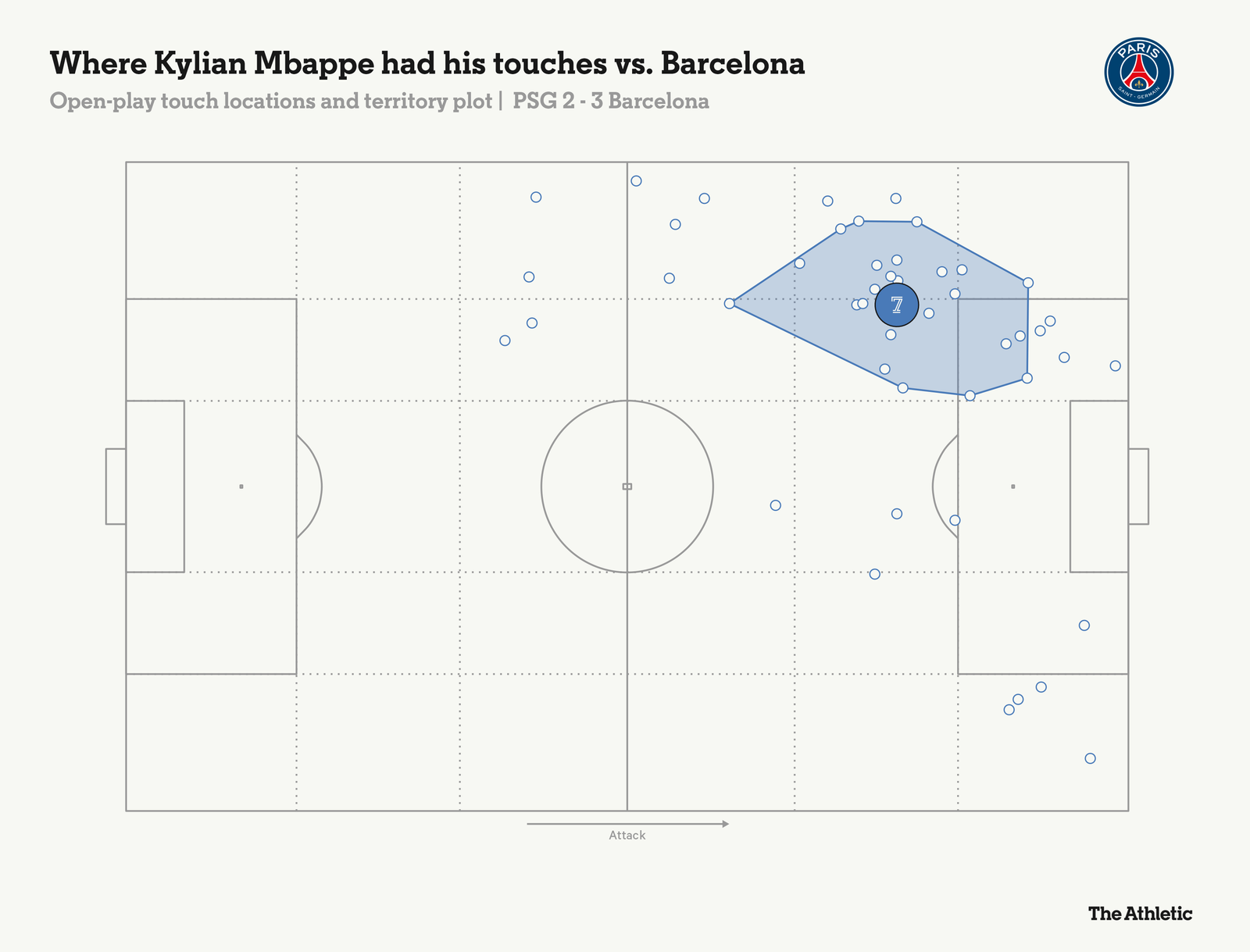
A big part of Mbappe’s quiet was Barcelona’s strong defensive shape, in a compact 4-4-2 mid-block that gave plenty of wide coverage. His international team-mate Jules Kounde was quick to get tight and was backed up by Ronald Araujo, who has often been used by Barcelona to defend against Vinicius Junior in Clasicos — the best practice for defending Mbappe.
Luis Enrique’s half-time switch to a split-strikers system gave him more space to run in behind, as in the first half Mbappe had been too eager to drop to the edge of the box when PSG got into crossing positions. Xavi stressed a necessity to prevent PSG counter-attacks, aware of Mbappe’s threat in big spaces, with Sergi Roberto’s tactical foul yellow card an example of their defensive approach.
Liam Tharme
What did the head coaches say?
We will bring you the reaction from Luis Enrique and Xavi once they have conducted their post-match press conferences.
When’s the return leg?
Tuesday, April 16 at 8pm UK, 3pm ET.
Recommended reading
(Top photo: Alex Pantling/Getty Images)
Read the full article here


